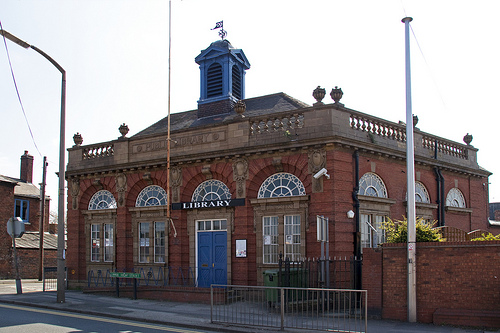 Since the global financial crash, public libraries in the UK have come under threat in the face of local government budget cuts. It is the logic of market values and profitability, rather than by a concern for inequalities, community and inclusive access to information and literature, which is the criteria upon which this area of public spending is being judged. Daniel Bailey argues that we should not apply the market logic to public libraries, but instead see them as an essential public good.
Since the global financial crash, public libraries in the UK have come under threat in the face of local government budget cuts. It is the logic of market values and profitability, rather than by a concern for inequalities, community and inclusive access to information and literature, which is the criteria upon which this area of public spending is being judged. Daniel Bailey argues that we should not apply the market logic to public libraries, but instead see them as an essential public good.
One of the most distressing aspects of the coalition government’s austerity drive in recent years has been the cuts to, and widespread closures of, library services; a trend which feeds into a wider debate about the sustainability of public libraries in the midst of political antipathy towards the very notion of a taxpayer-funded public good.
Public libraries have helped shape a more inclusive society ever since the Public Libraries Act 1850 gave boroughs the power to establish book lending services free at the point of use – a service which had a tremendous effect on improving literacy. The collectivised philosophy underpinning these services inspired Conservative Party opposition to this Act on the grounds that they may incubate social agitation and subversion. Today, they still provide a common space where information and literature is accessible to all, help cultivate community spirit, and provide computer and internet facilities particularly valued by the elderly and job-seekers (as noted by a survey conducted recently on behalf of the Bill and Melinda Gates Foundation). Indeed, it can be seen as an exemplar of a public good.

(Credit: ahisgett)
In the modern age, the environmental rationale that the supply of these services carries a far lower carbon and resource footprint than the individualised, first-hand outlets of popular book shops or shopping websites should offer an additional incentive to preserve these local institutions. Although individualising book consumption is more likely to stimulate the GDP statistic, collective services enable scarce resources to be shared in cost-efficient and environmentally sensitive ways.
Since the global financial crash, public libraries have been subject to an increasingly intense fiscal audit in the face of reduced local government budgets as it has been deemed by many that the UK – the eighth wealthiest nation in the world – does not possess the necessary resources to preserve them. According to the CIPFA, this has resulted in a 9.4% fall in total expenditure on library services in the last two years, and a 20% reduction in library staff since the 2008/09 financial year.
As a result, a survey conducted by the Chartered Institute for Library and Information Professionals in December 2012 showed that overall library opening hours are reducing by 1,720 hours per week, and The Guardian recently reported that 439 libraries across the UK have closed since 2010 with a further 280 currently under threat.
This is a particularly acute concern in the more deprived areas of the country which are suffering greater cuts to local government spending than more affluent areas (by around 5.6% according to the Joseph Rowntree Foundation). It is a disparity partly caused by the initial higher levels of spending in deprived areas but it is a distribution of cuts which threatens to entrench existing geographic inequalities, compounded by the socially uneven supply of ‘big society’ volunteers who have been expected to supplant the declining labour force.
Yet, it is clear that the dominant logic which governs this area of public spending is not characterised by a concern for inequalities, community and inclusive access to information and literature. Rather, it is the logic of market values, profitability and a concern for “getting a good deal for the taxpayer” which is the criteria upon which this area of public spending is being judged. Indeed, these have been the discursive prisms through which government spending on public goods have been judged for some time, but the perpetual fiscal audit has intensified since 2008.

(Credit: ricardo266)
It is the conceptual centrality of market values which predominates political discourse even in the case of libraries. Areas of the public sector which are proving profitable tend to be marketised or privatised. Areas of the public sector which are not are seen as taxpayer-funded, decadent indulgences and are thus put under pressure to make severe cutbacks.
This market logic is the measurement with which libraries are faced, rather than the protection of public goods. The notion that a non-profit oriented service could be sustained by taxation for its value as a public good seems antiquated to some, including Will Gompertz who relays the message that in “Austerity Britain, everything must earn its keep; contribute to the bottom line”.
That this profit-led logic is dominant in government as well as the marketplace is an inducement of retrenchment for any area of public spending which as its modus operandi has de-commodification and collectivisation at its core. Even if the majority of UK public services were institutionalised in a period of post-war austerity, where public debt figures dwarfed those of today, these services are now subject to a market-based ideological framework.
Of course, libraries cannot be beyond reform – developing a range of new services and to bring them into the digital age (such as through access to e-books, apps, talks and courses, for example) is entirely desirable. Yet their status as a public good is inimical to the prevailing mentality of contemporary politics and places them under fierce fiscal pressure in the current period of fiscal consolidation.
In a country where social mobility has been gradually eroded and inequality exacerbated, and in a world where greater care should be afforded to our natural resources, public libraries have much to recommend them. Alas, the drive towards consumerism and commodification that has characterised recent decades means that we now have more book shops in the UK than public libraries.
The deployment of TINA (There Is No Alternative) style discourses have come to circumvent any deeper questioning of public library sustainability; and any attempt to go against the grain of the dominant logic has been met with disdain by, the Secretary of State for Communities and Local Government, Eric Pickles who has described library campaigners as “a bunch of luvvies”. But even in an age of constrained state resources, options remain for policy-makers in determining which areas of public spending must be cut and the levels and architectures of taxation. Indeed, it is these political choices which demonstrate who we truly want to be as a country. As J. K. Rowling wrote, “it is our choices… that show what we truly are, rather than our abilities”.
The simple but fundamental question underlying this dilemma, therefore, is what kind of country do we want to live in? Is it a country where this level of state retrenchment is seen as desirable and where anything which doesn’t directly make a profit is deemed to be an expensive extravagance? Or a country committed to the engines of social mobility, democratising access to information and resources, community and the transition to environmental sustainability?
If it is the latter, then, are we willing to countenance the idea of implementing a more progressive tax system to finance it? In recent years the prevalent political impulse has been to retrench state spending – and particularly of those areas not conducive to the pursuit of growth – rather than revitalise an interventionist state. But as a famous author once stated: there is a tide in the affairs of men.
This piece is dedicated to my late Mother, Gill. She was a Chartered Librarian and a lover of public libraries.
Note: This article gives the views of the author, and not the position of the British Politics and Policy blog, nor of the London School of Economics. Please read our comments policy before posting.
About the Author
 Dan Bailey is a PhD student at the University of Sheffield.
Dan Bailey is a PhD student at the University of Sheffield.






You have comprehensively summed up the significance of public libraries as reservoirs of knowledge for the book lovers and the general public. The decision makers both at the local and national level sometimes do not visualize the potential benefits of a learned society and the public libraries become soft targets for budgetary reductions and closures. Over the past two decades, the newcomers from EU have arrived with different priorities whereas a considerable number of original inhabitants have either moved abroad or taken up residence in rural areas. There should have been more emphasis on the expansion of mobile library services to meet the intellectual and recreational needs of citizens. Although around 400 to 500 hundred public libraries have been closed across England and Wales since 2010, the libraries in some developing countries are being established, book fund allocation has greatly increased and qualified librarians [with British qualifications] are recruited to run the services. My recent visit to Qatar National Library was eye-opening where I found a large number of students, parents, and children have come to borrow books. It appears to be a National as well as public library that also includes a coffee outlet, a restaurant, a theatre, an art gallery, exhibition center, conference hall, and all the electronic devices, internet facilities and a warm, friendly and welcoming atmosphere. As for as UK population is concerned, Even in the United Kingdom, love for holding a printed paperback while traveling on the trains, buses or airplanes clearly indicates how much the British people like reading. Perhaps, we do have the likes of Colonel Sibthorp who are determined to close down all public libraries in the UK. However, the Scottish local councils are actively protecting the integrity of public library services despite budgetary restraints. [Dr Nazir Ph.D.( London) Dip.Lib.Manchester, CILIP Member since January 1970 and Chartered since 1974]
Here we are in April 2017 and, sadly, not much has changed. Libraries (including my own local one where I have worked for the past seventeen years) are suffering death by a thousand cuts. We have become masters at improvising and using the ever deminishing resources to hand but in the end, because box ticking and spreadsheet statistics mean more than community and I fear the principle of a sharing society is gradually being eroded. We not only need a change of government but a new philosophy to become a more caring and inclusive society.
Great article though, in the midst of everyone talking about the budget cutting and whatsoever. The questions in this articles should arise in Malaysia too, since there is a very little public spending on public libraries and the efforts to flourishing the needs of public libraries in the nowadays society.
Public library service is essential infrastructure, arguably more important than many road schemes & certainly more important than railways. Librarians do not suck money out of our pockets like bankers or foreign investors. Libraries are a lot less worrying than nuclear weapons and probably do more good than armed forces.
Many thanks, Daniel, for keeping the conversation about public libraries alive. I wonder, is there a Third Way, or middle ground, that will help us demonstrate the enormous social value that public libraries bring to our communities? My thoughts: http://287.hyperlib.sjsu.edu/gglibraryblog/2014/03/05/is-there-a-third-way-for-library-valuation/
I hope Dan will prepare a submission to the government’s Sieghart Review on Libraries (open till 21st March) as his views should be of much interest to them
https://www.gov.uk/government/consultations/public-libraries-what-do-you-think
Great article! And really important! The type of thinking you outline (that all things must be justified by profit) has led us to a world of greater inequality and the erosion of public services.